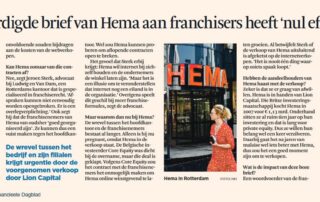HEMA in conflict with franchisees about e-commerce agreements
On 18 July 2018, the District Court of Amsterdam, ECLI:NL:RBAMS:2018:5098, rendered a judgment in proceedings on the merits in which the franchisees were largely ruled in favor of e-commerce. Earlier, in summary proceedings, it was ruled otherwise. See the judgment of the Amsterdam District Court of March 6, 2018, about which I wrote earlier here.
HEMA believes that the existing regulation from 1997 on the contribution to the costs of e-commerce is outdated. Until a few years ago, the contribution for e-commerce was always determined in close consultation with the franchisees. After that, no agreement was reached on the settlements.
In the summary judgment of 6 March 2018, the court ruled that it must be determined in the proceedings on the merits how the agreements on the contribution to e-commerce should be interpreted. Without anticipating the decision of the court on the merits, the preliminary relief judge did see reason to order HEMA to provisionally suspend the collection of the e-commerce contribution it believes to be due.
On July 18, 2018, the judge on the merits of the District Court of Amsterdam has now ruled on how the agreements on the contribution in e-commerce should be interpreted. In 2015, agreements were laid down in a settlement agreement about a framework of standards to be created for determining the franchisees’ contribution to e-commerce.
The central question is whether an agreement has been reached in 2015 or whether the framework of standards for the calculation of e-commerce has been agreed depends on the outcome of the evaluation of the existing agreements on e-commerce from 1997. The franchisees dispute this. The court ruled that no such agreed dependency had been demonstrated. The agreements from 1997 therefore remain in full force. The parties are still prepared to further develop the standards framework, so that there is no question of a failure by the franchisees to the agreements from 2015.
Apparently, the recalibration desired by HEMA is aimed at increasing the contribution of the franchisees. The franchisor must put forward very good reasons for such a unilateral change to the existing agreements. The stubbornness of the franchisees, as claimed by HEMA as the franchisor, to reassess the agreements made in 1997, is against HEMA. Perhaps HEMA has overplayed its hand?
mr. AW Dolphijn – franchise lawyer
Ludwig & Van Dam Franchise attorneys, franchise legal advice. Do you want to respond? Go to dolphijn@ludwigvandam.nl .

Other messages
Late notification that no franchise agreement will be concluded
On April 11, 2017, EQLI:NL:GHARL:2017:3104, the Amsterdam-Leeuwarden Court of Appeal not only assessed the question of whether the negotiations on a franchise agreement to be concluded
Want to get rid of your franchise agreement in the meantime?
Franchise agreements are usually concluded for a longer period of time. How do you break open a franchise agreement?
HEMA in conflict with franchisees about e-commerce agreements
On 18 July 2018, the District Court of Amsterdam, ECLI:NL:RBAMS:2018:5098, rendered a judgment in proceedings on the merits in which the franchisees were largely ruled in favor of e-commerce.
mr. J. Sterk about HEMA conflict in the FD 18 July 2018
mr. J. Sterk about HEMA conflict in the FD.
Column Franchise+ – “Legal Franchise Statistics 2018”
The Legal Franchise Statistics have been compiled for 10 years by Ludwig & Van Dam attorneys on the basis of all published judgments of judges.
Franchisor prohibits opening (franchise) company
A franchisor applied for interim measures to prohibit a franchisee from opening a franchisee's business.






